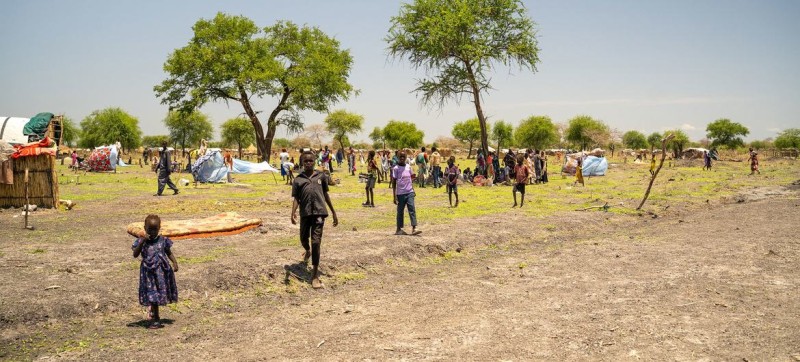
© UNMISS/Peter Bateman South Sudanese refugees are returning home following unrest in Sudan.
“Now is not the time to take our eyes off the ball in South Sudan,” said Nicholas Haysom, who also heads the UN mission in the country (UNMISS). “What we can learn from Sudan is how quickly hard-won peace gains can unravel.”
On the political front, the Sudan crisis is reducing “much-needed bandwidth” to focus on South Sudan during its critical transition phase, he said.
While commending President Salva Kiir and regional body the Intergovernmental Authority on Development (IGAD) for advancing initiatives to end the Sudan conflict, he said the “timeline of the peace process in South Sudan should not be allowed to become the opportunity cost of these efforts”.
Rippling effects
The Sudan crisis, which began when rival militaries clashed in mid-April, has caused a broad range of ripple effects, among them the implementation of the Revitalized Peace Agreement in South Sudan, he said.
The conflict has also strained Government capacities to receive thousands fleeing violence across the northern border and could hobble the economy.
“Crude oil exports are an economic lifeline,” Mr. Haysom said. “If interrupted, as recently threatened, [it] could have devastating effects on the South Sudanese economy.”
South Sudanese returnees comprise more than 93 per cent of the 117,000 people entering the country while fleeing the continued fighting in Sudan, he said, adding that the absorption capacity of the Government and humanitarians is under strain, notably in the border town of Renk.
Deadly clashes
At the same time, these factors are exacerbating existing triggers and drivers of conflict across South Sudan, including in Renk and Malakal, amid increased competition over scarce resources, economic hardship, pre-existing communal tensions, and the presence of firearms, he said, adding that two violent deaths had triggered deadly clashes with armed youth groups.
Tweet URL
At the authorities’ request, humanitarians have temporarily suspended the movement to Malakal of new arrivals from Sudan, he said.
For its part, the UN mission’s prevention plan includes intensified patrols and reinvigorating its presence on the ground, he said.
‘Patchwork of conflict’
“The flare up of tensions in Malakal only adds to the much wider patchwork of intercommunal and subnational conflict that the [UN] Mission is grappling with,” he said, highlighting such human rights violations as extrajudicial killings.
After four years of incessant rainfall, an expected drought can threaten food security, he said, condemning attacks on humanitarians and the recent theft of seven tonnes of supplies from the World Food Programme (WFP) on the ground.
With needs increasing and resources dwindling, humanitarian actors have had to redirect funding to address the influx of South Sudanese returnees who are fleeing the violence in Sudan, he said, noting that only one third of the current humanitarian response plan is funded.
Politics and progress
“As it stands today, South Sudan is not ready to roll out an electoral process,” he said, adding that all stakeholders recognizing the urgent need to address the issue. “We also believe that with a united effort amongst all parties, it may be possible for South Sudan to make up the gap.
The constitution-making process is 10 months behind schedule and the election is nine months behind, he said.
As such, he urged the relevant stakeholders to “double-down” on passing the National Elections Act in Parliament and operationalize the National Elections Commission, “so that the South Sudanese people can begin to decide the form and content of their new constitution and electoral system”.
However, no electoral process can be credible and successful without adequate civic and political space for all citizens to participate in it, and a great deal needs to be done in this regard, he added.
“The challenges are many in South Sudan, but I am hopeful that with cooperation, partnership, and sustained leadership, a positive change in the lives of the South Sudanese people can be achieved,” he said.

